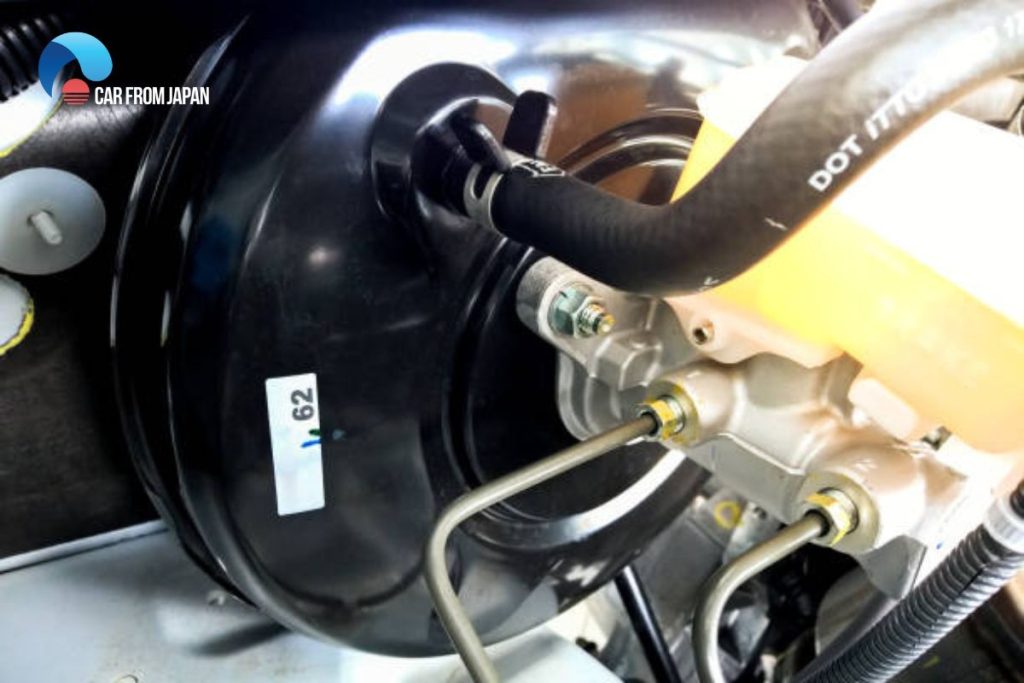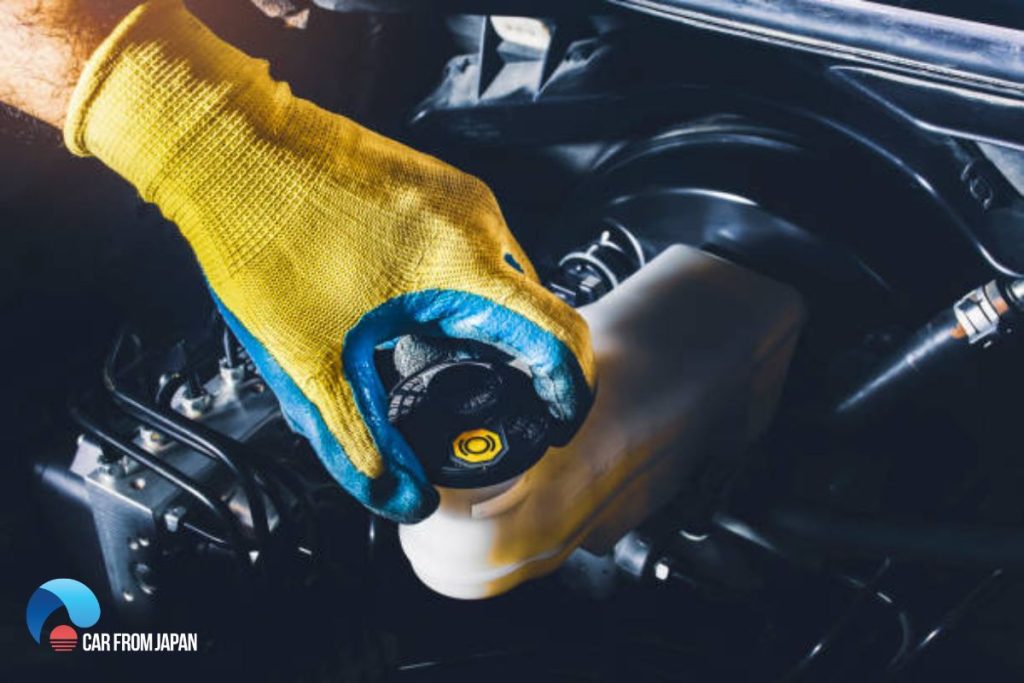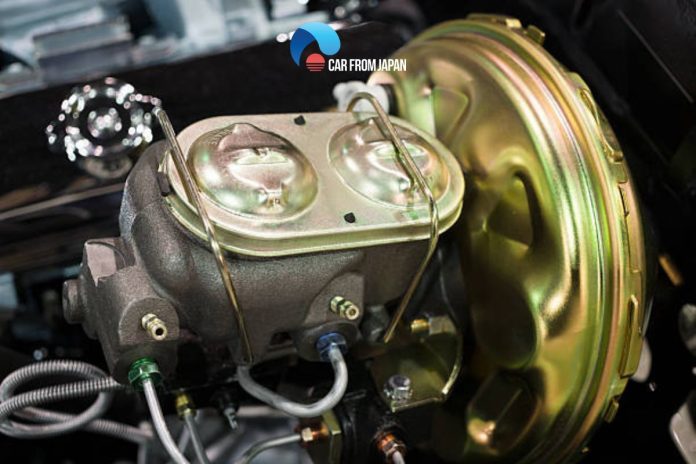Is your car taking longer to stop than usual? Does the brake pedal feel spongy or hard? Are you hearing strange noises when you apply the brakes? These could all be warning signs of a failing brake booster or master cylinder. Recognizing these symptoms early can save you from a potentially dangerous situation and costly repairs. So how to tell if brake booster or master cylinder is bad?
Contents
How to tell if Brake Booster or Master Cylinder is Bad
A brake booster connecting the brake pedal and the master cylinder is known to suppress the high fluid pressure by the use of a vacuum stored in it. The purpose of the brake booster is to decrease the force needed when pressing down on the brake pedal. In fact, with this booster, the driver doesn’t have to exert extra pressure on the pedal, while stopping or reducing the speed of the vehicle.
Contrarily, the master cylinder found in every modern car today begins to operate when the brake pedal is pressed. It pushes the fluid from the reservoirs to the lines in the braking system, which exerts pressure on the brakes. Finally, this pressure slows down the car or causes it to halt.
Now, after comprehending the basic meaning and functioning of these components, let’s learn how to tell if brake booster or master cylinder is bad?
Symptoms of a bad brake booster
Vehicle stops at a longer distance
When the air bubbles enter the brake lines via the master cylinder, it reduces the pressure that causes the brake to apply very softly. This situation immediately calls for the inspection of the valve (responsible for removing the excess air bubbles inside the system). Or else, the problem of vehicles stopping at a longer distance, after the brake is applied, would continue.

Needs to apply more force on the brake pedal
The check valve is responsible for controlling the pressure inside the master cylinder. If this valve starts creating a problem then, it turns the soft and smooth pedal into the aggressive and hard brake pedal. So, whenever it gets difficult to engage the brake pedal, seek its inspection from a certified mechanic.
Stalling the engine
When the diaphragm inside the brake booster fails, it allows the excess vacuum to enter the system from the engine. As a result, when the brake is pressed, the engine stalls or has a rough idle which can later cause issues that are more serious.
Therefore, before you encounter any event of a brake failure, it is better to take your vehicle to the nearest trained professional.
Check engine light on
A dysfunctional brake booster can have a vacuum leak allowing unmetered air to enter the engine. This causes more air than fuel in the combustion process also known as a lean mixture. At this time, the misfire will happen in the engine and the check engine light will show off on your dashboard.
Strange noise
If you hear a constant sound like a hissing noise when you press down on the brake pedal. This can be a symptom telling that the brake booster has trouble. When the diaphragm inside the brake booster is torn allowing air to pass through. However, if you hear a hissy sound without pressing down the pedal then you might have a faulty brake booster plunger seal.
Watch this video to know how to test the the brake booster:
Symptoms of a bad master cylinder
Abnormal clutch pedal behavior
Under normal circumstances, a functioning brake pedal should feel firm when depressed. However, if you notice the brake pedal starts to feel spongy when pressing, it will be an automatic sign that your brake master cylinder may be having an issue. At that time, it indicates the presence of air in the hydraulic brake system.
If you have to exert extra pressure on the brake pedal then, there are chances that the master cylinder has the air inside it, which is further causing leakage of fluid.
Or, if the brake pedal is depressing itself then, this means that the heated brake fluid is not able to expand. Because of this, it causes extra pressure on the brake lines.
Worn-out master cylinder seals
The rubber seals used in the hydraulic system not only help keep the brake fluid from coming out but they also prevent dirt and debris from mixing with the brake fluid. The rubber seal on the master cylinder wears out with time. And, if these seals are not replaced timely, they may contaminate the brake fluid. Thus, causing the pedal to get soft and doughy or slowly sinking to the floor.
Brake fluid leak

An external leak can come from the grommets between the reservoir and the body or from the seal inside the master cylinder that’s closed to the brake booster. Internal leaks could also occur if the seals are torn preventing the brake cylinder from holding the pressure when pressing the brake pedal.
In addition, if you notice that the fluid is darker or brown than normal, it’s also a sign of a bad brake master cylinder. It could be the moisture debris that enters through leaks on the seal because the master cylinder uses rubber seals that can break down over time.
Watch this video to know how to test the brake booster:
FAQs
How much does it cost to replace a brake booster?
The cost varies depending on the vehicle make and model, but expect to pay anywhere from $200 to $500 for parts and labor.
Is it cheaper to repair or replace a master cylinder?
In most cases, replacing the master cylinder is more cost-effective than attempting a repair.
Can I drive with a bad brake booster or master cylinder?
It’s strongly advised against driving with a known issue in your braking system. It’s extremely dangerous and could lead to an accident.
Final Thoughts
After knowing how to tell if brake booster or master cylinder is bad, it is the responsibility of the driver to keep a check on the brake system of the car. And in case you locate any of the above symptoms with your car, it’s better to take it to the expert mechanic.




I drive a Toyota double cabin D4D. It’s not smoking, but can not start until I push for close to 40 meters to start the engine. the battery is good. Could it be due to worn out rings or what? I checked both heater plugs and nozzles but they are ok. What is wrong?
I didn’t have ANY ISSUES with my breaks, in fact my regular mechanic told me I had aprox 10,000 miles before my pads would need to be replaced. 3,000 miles later I brought my car in for a General inspection as I was going to be taking my three children on a road trip with me. The Machanic on staff that day said I needed new break pads immediately, so I had them replaced. We made it from Florida to Louisiana with no problems the dayb before we were to leave to come home, We got in the car to go to the playground and my break light was on and petal was going to the floor! I checked the break fluid and it was VERY LOW! I added aprox 16 ounces of fluid the strange sound stopped and the Break light went off but the petal still had to be compressed to the FLOOR before the vehicle would stop! I made it safely back to Florida and returned to the Machanic who is telling me that the master cylinder and booster are “NOW SHOT” this isn’t the first time I have brought my car in for General maintenance and had it returned with BIGGER ISSUES! Is it possible that the Machanic did something wrong or didn’t do something correctly that would have caused this MESS??? They’re taking no responsibility and wanting to charge me almost $3000 to fix an issue that didn’t exist prior ??♀️ Any advise you can give would be greatly appreciated Thanks in advance!
So, when changing the brake pads, a mechanic will not need to do anything to the hydronic system of the vehicle meaning all he does is depress the caliper pistons using a clamp to slide the brake pads in. With that being said, it is unlikely the mechanic was at fault. If you had a caliper replaced, then the tech would of had to bleed the braking system to rid it of air.
More than likely a seal wore out on the MC or BB. It’s hard to say with out knowing the year make and model. Another option would be you had a leak in a brake line. I strongly recommend in the future to get second opinions. $3000 is entirely too much to charge for such a simple job. I’d have it all set in 4 hrs.
Brakes….. not breaks. My god.
my brakes come on after a short drive pedal gets hard and brakes come on. changed all parts acept booster and maqster cylinder. any info on what is gone!
its a kia rio5 2007
my 2003 4 runner brake pedal without warning or lights, would not stop and i had to use the emergency brake…like nothing there. repair shop states my truck will not communicate with the diagnostic machine..no leaks, no bad cylinders…but i have no brakes. new pads, rotors, the works less than a year ago.
Would like to understand how drive 2 in automatic cars work
When I pressed my brake pedal it pull to left side, my caliper brake house pipe are all good and working properly and refaced rotor and install new brake pads tyre pressure and leaf spring is maintained but still the issue remains same plz help..
Thanks for pointing out how a hard and aggressive brake pedal can point to a problem with your brake booster. My son frequently goes on interstate drives to meet up with his clients. Naturally, he relies a lot on his car for his business. I wouldn’t want him to get any car trouble while on the road, so I will be sure to advise him to get his car into a car shop immediately should he find any abnormalities with his brake pedal.